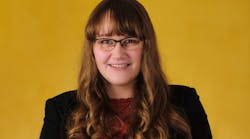Young Engineering Award finalist becomes a role model for women in STEM
Lisa Ihde is one of three young and highly motivated finalists for the Young Engineering Award, which will be announced on April 21, during the WomenPower Career Congress at Hannover Messe (Figure 1). The initiative is intended to boost motivation for women to take up a career in science, technology, engineering and mathematics (STEM).
Along with Ihde, Dr. rer. nat. Soraya Laghmari El Moussati, a lead engineer for environmental technology at Bayer in Leverkusen, Germany, and Carolin Neumann, an associate application consultant at IBM, are nominated for the Young Engineering Award.
From the Hasso Plattner Institute (HPI) in Potsdam, Germany, Ihde is a web designer, software engineer, design-thinking coach and author. As co-author, she was instrumental in writing "Learn how to implement games with the visual programming language Scratch." Because the games industry, like the IT industry in general, is heavily male-dominated, it’s important for women in the industry to get involved to a greater extent, in order to change the image of women in digital games. With her commitment, Ihde is a role model for all young women who decide to pursue a career in IT or game design and who need strong role models for these career choices.
Did you have any coach/mentor in the digital-game industry or throughout your studies who helped you to navigate the male-dominated domain and encouraged you to continue with a STEM career?
Lisa Ihde: My friends and family gave me a lot of support in my goals during my studies, and I learned at the Hasso Plattner Institute (HPI) that you can achieve a lot together. At the HPI, I always found someone who had an open ear, and I also used opportunities for special career coaching and mentoring that were provided by the University of Potsdam for women. In addition, I also have a network of people whom I like to ask for advice or exchange ideas with other women. One of these women is Johanna Janiszewski, who is the founder of her own game studio and is therefore unfortunately one of the few women who hold a management position in the industry. We know each other from joint programming workshops that we have run, and we also published a book on game design together last year. I believe that having access to mentorship and coaching opportunities is important for women in technology, and I hope to pay it forward by mentoring other women and helping to create a more diverse and inclusive industry.
What are you doing to make yourself a role model or mentor to other girls/women who are interested in pursuing a STEM career?
Lisa Ihde: Since 2014, I have volunteered as a mentor in workshops and hackdays for pupils in Germany and as a lecturer in online courses for children. I speak at events or mentorship programs that support girls and women in STEM. This provides an opportunity to share my knowledge and experience, including the challenges I faced and how I overcame them. This can inspire and encourage other women to pursue a similar path and see themselves as a role model. Additionally, I worked as a gender equality officer at the Hasso Plattner Institute for more than five years and created an inclusive environment, supporting the success of women and underrepresented groups. I always offer my support and guidance to women who are interested in pursuing a STEM career. This can include answering questions, providing feedback on projects or connecting them with other resources and networks. Last year, I was particularly proud that I was able to help a fellow female student to get a scholarship from Google, which I received a few years ago. For a few months, I have also been an official Women Techmakers Ambassador to support women in technology who are looking to create impact and give back to their communities. At International Women's Day, I organized an event on scholarships and awards for women in tech with the theme “Dare To Be.”
With the skilled labor shortage that began pre-pandemic, was heightened by the shutdown and continues to linger, how can organizations capitalize on the availability of women to fill these skilled positions?
Lisa Ihde: Organizations can review their recruitment practices to ensure that they are inclusive and welcoming to women. This can include removing gender-biased language from job descriptions, using diverse recruitment sources and providing training to hiring managers on how to avoid bias. Many women are balancing work and caregiving responsibilities, and offering flexible work arrangements can be a key factor in attracting and retaining women in the workforce. Organizations can offer flexible schedules, remote work options and other benefits that support work-life balance. They can provide training and development opportunities to help women build their skills and advance in their careers. This can include mentoring programs, leadership development programs and on-the-job training opportunities. A supportive and inclusive culture can be a key factor in attracting and retaining women in the workforce. Organizations can create a culture that values diversity and inclusion and provides opportunities for women to collaborate and network. At the HPI, I have established with fellow students a so-called FQ Lounge to ensure more visibility of women in tech and management positions and to offer a place for exchange.
In her relatively famous study, published in the Harvard Business Review, MIT’s Susan Silbey and her colleagues found that women in engineering were hoping to make a more socially conscious impact in their engineering pursuits than the males in the study. What, if anything, does this tell us about gender bias? And, if the report is indicative of a real female desire to make a difference, where might women find those types of jobs to have a positive impact on society and civilization with their engineering and automation expertise?
Lisa Ihde: The findings of the study by Susan Silbey and her colleagues suggest that gender bias exists within the engineering field, with women being more likely to prioritize social impact in their work than men. This bias could stem from societal expectations and stereotypes about gender roles, with women being more often associated with care-giving and social responsibility. However, it is important to note that individual motivations and interests can vary widely, and not all women in tech may have the same priorities or interests. Nevertheless, the study highlights the need for a more inclusive and diverse engineering field that values a wide range of skills and interests. To find jobs that have a positive impact on society and civilization, women in tech can explore opportunities in fields such as sustainable energy, renewable resources, healthcare technology and social impact startups. They can also look for companies that prioritize social and environmental responsibility in their mission and values. Furthermore, women can seek out networking and mentoring opportunities within these fields to connect with other women in engineering and learn about potential job opportunities. By actively seeking out these opportunities and advocating for their values, women in tech can make a positive impact in their work and help to shift the field toward greater social responsibility.
In this regard, I would like to mention two more tech initiatives for children and young people. On the one hand, the program Jugend Hackt, which has been offering hackathons for young people in Germany with the slogan “Improve the world with code” for 10 years, and this always results in incredibly great projects that are good for the environment and society. On the other hand, there is the GoodLab, which is a makerspace in Berlin that wants to shape the world together in a sustainable way and combines education for sustainable development with education in the digital world along the 17 Sustainable Development Goals.
What was your motivation for venturing into STEM studies in the first place?
Lisa Ihde: Already at school I was fascinated about logical connections and absorbed the content of every math lesson. Each new formula was for me like another spell for Hermione from "Harry Potter." At the age of 11, I discovered a book, which belonged to a series called "Addy" and lured me to create my own homepage. I thought it would be complex, but when I opened the book up it turned out to be quite simple. Through this book I realized my first homepage, and I was enthusiastic about programming and took part in working groups at school. My brother had started studying at the HPI, but unfortunately he hadn't told me that much about it. When I then wanted to find out what he was studying, I became aware of the offers for pupils on the website. When my school did not have enough students to continue my computer-science classes, attending the HPI Schülerkolleg was a highlight of the week. Here I got to know and appreciate the atmosphere at the HPI in Potsdam. This changed my career aspirations from mathematics teacher to software developer. My enthusiasm for programming continued to grow during my bachelor's degree at HPI. Programming is not only fun, but you also make new friends and learn a tool to solve your own problems. I always feel like an inventor who can implement technical and innovative products that can have a positive impact on tomorrow's world. I am currently aiming for my master's degree and am thinking about changing my profession from software developer to professor after my master's degree.





